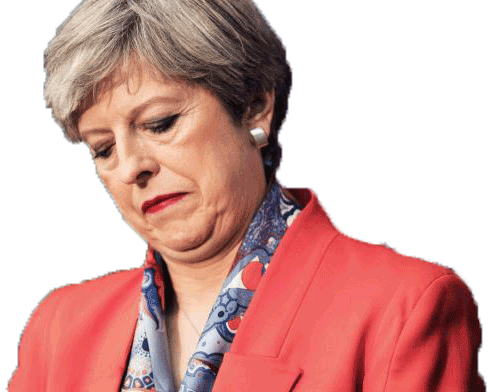04 April 2019
“One Step Forward…”
In a fix.
By J R Thomas
 “…all those with safe jobs,” runs a variant of the old joke. “Not you, Theresa.”
“…all those with safe jobs,” runs a variant of the old joke. “Not you, Theresa.”
But first we must say, farewell, Dominic Grieve. Mr Grieve, patrician in appearance and behaviour, was briefly almost famous for being Attorney General under David Cameron until sacked for some “misunderstood” words, words about corruption in ethnic minority communities. He has not been misunderstood about his views on Brexit though. He is profoundly against it, although his constituency (Beaconsfield) voted Leave in the Referendum. Since then he has been thorn-like in Mrs May’s side; last week his constituency association deselected him as their candidate for the next general election. Mrs M might have taken that as no great loss, but rather eccentrically she has expressed support for him. This could be simple prudence in trying to contain Tory association uprisings in the Home Counties, or maybe she hopes that if she is nice to him he may yet vote for her deal. Or even just not join the Independent Party, now Change Party (an odd name for a group wanting to keep things as they are). Certainly Ms Soubry’s escape from Toryism seems to be accelarating rapidly; she was filmed enthusiastically cheering Labour’s David Lammy calling the European Reform Group “Nazis”. Didn’t we agree that was a nasty word, Anna?
But Theresa’s rebellion problems seem to have reached the terminal stage. She finally bowed to the chorus from all sides and said that she would resign once her Brexit Bill was passed. In spite of several cynics pointing out that she would now have strong reasons to ensure it was never passed, her party has assumed the lady will soon be gone and practically every M.P. in the Conservative Party, probably including Mr Grieve and Ms Soubry, are drawing up manifestos as to why they should be chosen as her replacement. It seems likely to become a close run thing as to whether the Conservatives or the American Democrats take the record for the largest number of candidates for potential leadership. There must be a TV reality show in this somewhere, but this column will remain high-minded and eschew vulgarity. For a week or two anyway.
The eager candidates for the top job and central London flat (and agreeable country house in the Chilterns) assume of course that no general election is called in the next couple of weeks. Quite a big assumption that, though Mr Cameron helpfully ensured that no PM could spring such a thing on an unsuspecting Parliament by toddling off to the palace and asking the monarch to dissolve the Commons, by passing the 2010 Fixed Term Parliament Act. Now the Premier must give notice by getting a two-thirds majority of the Commons, or procure a vote of no-confidence in her own leadership.
Mrs May has one possible trick up her sleeve though, which would get the UK Brexited, if that is the right word, and perhaps keep her employed a while longer. Why this has not come further up her list of solutions is not clear, but it is starting to be talked about. She can simply ask the monarch to prorogue Parliament, at which point the session ends, and all those quarrelsome M.P.’s can go off to spend more time with their families. It is of course a little more complex than that and involves rather more ceremony, but it is one of the few weapons that Mrs May has more or less unfettered use of (she does not even have to ask Mr Bercow). Prorogation could take place this week with a new session assembling sometime after Easter. By then Britain would have exited the EU under the new agreed date of 12th April and on the basis of the Barnier/May deal. Nothing anybody could do about it – other than, no doubt, make a vast noise, especially from the Belfast direction. Remainers trounced, Tory diehards stymied. Deal done and dusted. At that point Mrs M could, surely would, stick to her word and step down as PM and party leader, having secured Brexit on her terms. And spend the rest of her life walking in the Alps, laughing delightedly every time she remembered trouncing them all.
Which leaves the Tory Party car looking as though it has done several circuits of a particularly brutal stock car race. The bodywork is smashed, most features don’t work, there are punctures in at least three of the tyres, and anything that does work is threatening to detach from the body. Any leader’s first job will be to put everything back together and make the old vehicle look as it prides itself on looking, a smooth, sleek, and responsive broad saloon. That will be difficult enough, but the new driver faces a much bigger challenge – in which direction should the Conservative car be driving?
Mrs May was always an enigma, and that was perhaps one of the reasons she became leader in the first place – nobody quite knew what she believed in, even on Brexit, but everybody convinced themselves she was broadly aligned to whatever the observor wanted. Now, with that always useful tool, hindsight, it is pretty clear Mrs May was an enigma to herself. Her policies consist of some not-been-nasty, some bursts of tightly regulated capitalism, and a lot of Metoo-ism. Not the Hollywood variety, but the Corbyn leaning type, where whatever the Corbynist Labour Party adopted was picked up in a soft watered down form by Mrs M – and that was before she made Mr Corbyn her new best friend. Banning, taxing, controlling, and subsidising is what has come from Theresa’s desk (and even more so from Philip H’s next door); Corbyn-lite, protesteth much of her party in the country.
 When Margaret Thatcher became leader of the Conservatives in 1975 she had the luxury of what she knew might be quite a long period in opposition. She also had the luxury of a clearly defined set of beliefs and an ability to articulate them to ordinary people in a very convincing way, even if the intelligentsia laughed at her housewifely analogies. She knew she had to convince the public that new Conservatism (as she did not call it) would work. But she also knew she had to sell it, to voters, pundits, commentators, even intellectuals. She poured a great deal of effort and money into engaging in as much research as the party could afford, to take her principles – not just hers, but those of her core supporters such as Keith Joseph, Nigel Lawson, Nicolas Ridley and Airey Neave – and convert them into policies that would appeal to voters most likely to support the Conservatives. By 1979, when she won the General Election, she had the most carefully thought-out, presented, and detailed manifesto that probably any British political party has ever set before the public. Its intellectual coherence and depth were not the least of the reasons the public were willing to buy Conservative in 1979.
When Margaret Thatcher became leader of the Conservatives in 1975 she had the luxury of what she knew might be quite a long period in opposition. She also had the luxury of a clearly defined set of beliefs and an ability to articulate them to ordinary people in a very convincing way, even if the intelligentsia laughed at her housewifely analogies. She knew she had to convince the public that new Conservatism (as she did not call it) would work. But she also knew she had to sell it, to voters, pundits, commentators, even intellectuals. She poured a great deal of effort and money into engaging in as much research as the party could afford, to take her principles – not just hers, but those of her core supporters such as Keith Joseph, Nigel Lawson, Nicolas Ridley and Airey Neave – and convert them into policies that would appeal to voters most likely to support the Conservatives. By 1979, when she won the General Election, she had the most carefully thought-out, presented, and detailed manifesto that probably any British political party has ever set before the public. Its intellectual coherence and depth were not the least of the reasons the public were willing to buy Conservative in 1979.
The present party has no research department (of any weight), no detailed manifesto, and, you might cynically say, no beliefs and no principles. Whoever takes over as leader has got to decide what the Conservative Party is for, what it believes in, and how it intends to get there. He or she has to convince the party that its members all believe in roughly the same things, and sell that to the media and the voters. And, minor detail, run the government of a post-Brexit Britain, which may well still have one leg trapped in the Brussels revolving door. Nearly fifty years after Mrs Thatcher, it will make her task look a doddle.


